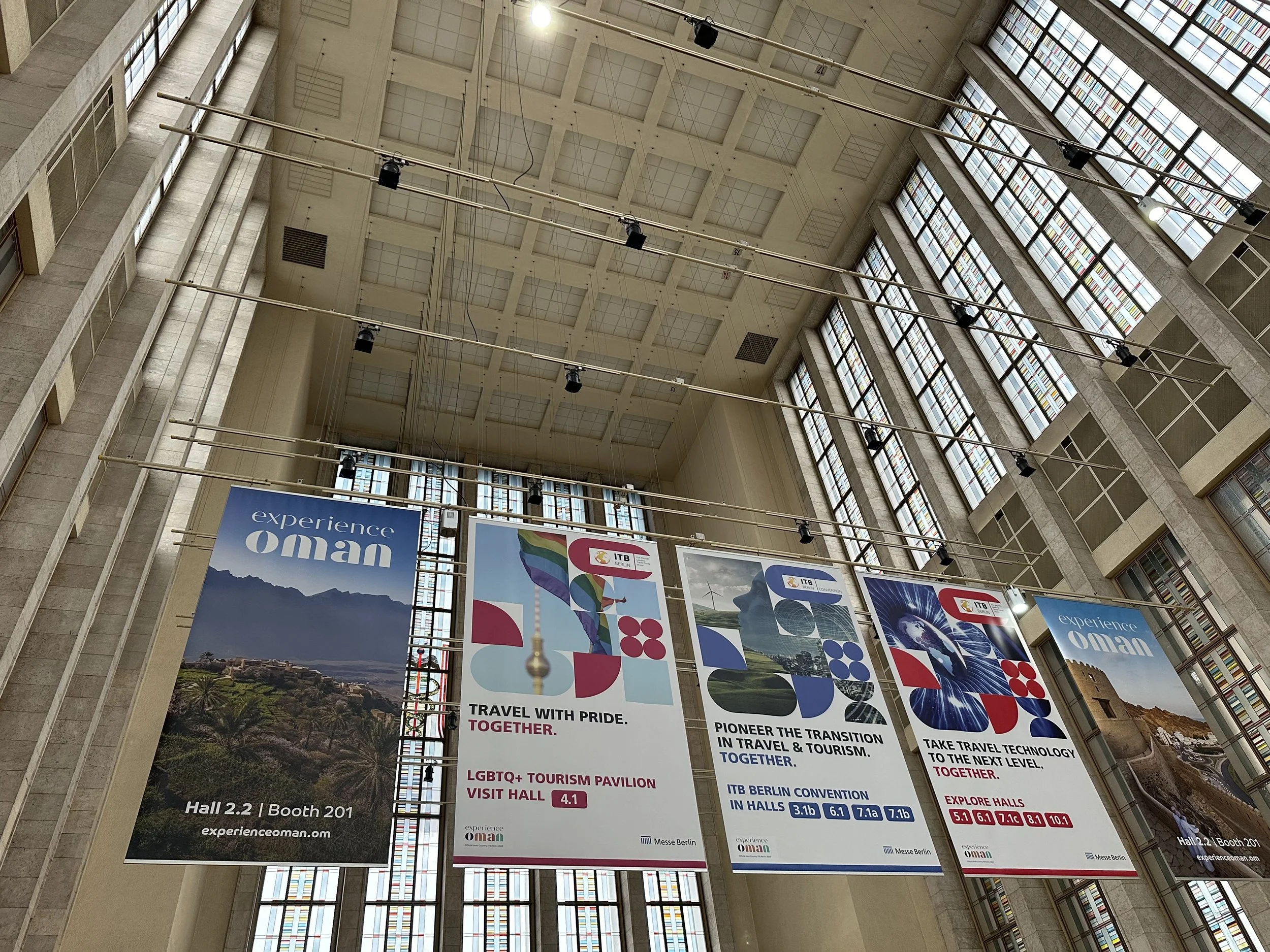Our 5 Key Takeaways from ITB 2024
This year’s discussions around sustainability at ITB Berlin were extremely important, especially with tourism representing 8% of the world’s CO2 emissions in the last years. The conference highlighted an important disconnect between the number of people who want to have a positive impact and the impact they actually have. For example, 64% of high-income earners want to help the environment, but their negative impact on the environment is still greater than the average traveler.
“95% of tourists are gathered in 5% of the planet.”
Moreover, the ITB Berlin Convention emphasized the issues with the current state of tourism, highlighting how 95% of tourists are gathered in 5% of the planet. While travelers have attempted to contribute to sustainable travel initiatives through environmental, social, and economic factors, 50-70% of tourism revenue doesn’t even stay in local destinations. Clearly, the tourism industry needs a revamp, with travel projected to increase in the next few years.
This message was central to our experience at ITB Berlin. We spent the entire week learning, growing, and developing our skills at the different panel discussions and presentations. From the importance of biodiversity and nature in the tourism industry, to the rise of experiential travel, to the way companies can and must send the right message, our team has collected the key takeaways from this year’s ITB Berlin Convention.
The Key Takeaways
Tourism is booming and increasing
In the next few months, 84% of hotel bookers plan to travel the same amount or more. It’s no secret, tourism is booming and trips are increasing more than ever since the pandemic. Travelers are turning their attention on specified tours, like food or photography tours, using this to guide their holiday bookings. Travel in private or small group tours has grown in popularity since 2020. Moreover, Tui Musement reported that outdoor travel experiences have grown 11% since last year. Tourists have a growing desire to get out of the city and explore smaller towns or natural destinations. Boat trips and cruises are also thriving.
“Travelers are turning their attention on specified tours, like food or photography tours, using this to guide their holiday bookings.”
Some popular countries for travel in 2024 include Germany and Mexico, with Utah and Wyoming being the fastest growing US based destinations. The UK, Italy, Japan, the US, and Germany are leading the way for travel, wanting wellness centered tourism. Tourists are motivated to travel based on the local experiences the destination provides. Viator also reports that bookings in Asia are growing 200% each year, whilst American customers are booking one longer international trip a year, alongside 2-3 domestic trips.
“Only 24% of German consumers have already decided on their hotel at the start of their travel planning.”
The convention highlighted how travel is increasing and it will continue to do so. There was an emphasis on the importance of family and friends, which contributed to travelers’ decisions to travel in general, where to go, and what to do. The convention did outline an important issue in the travel industry, which was the difficulty of truly matching the individual customer with the right product.
The increase of travel also means the entrance of new consumers into the market, with most travelers undecided on destination, accommodation, and more. In fact, only 24% of German consumers have already decided on their hotel when starting their travel planning. This highlights a lot of potential for hotels to attract new customers in 2024.
Biodiversity was center stage
Nature is travel’s key product and there is a need to keep it alive as the sentiment at many of the discussion panels this year. The topic of biodiversity was key, with an emphasis on how it was an important aspect of all companies. Tourism needs biodiversity to continue to offer its customers life changing travel experiences, and similarly, biodiversity depends on tourism and the money it generates for conservation. Right now, 60% of the global GDP depends directly or indirectly on nature-services, and it is clear that biodiversity underscores all aspects of our lives. The convection highlighted how biodiversity will be the driver for more and better green certifications, with hotels getting inspiration to take care of their natural spaces – this even applies to city hotels.
“Tourism needs biodiversity to continue to offer its customers life changing travel experiences, and similarly, biodiversity depends on tourism and the money it generates for conservation.”
This year, ITB Berlin also focused on the need to rethink our approach to biodiversity. Firstly, there is a misconception that biodiversity is not linked to the climate, which must be changed as climate protection means protecting biodiversity. Secondly, biodiversity shouldn’t be linked to carbon offsetting, with most travelers prefering to use their money to contribute to local communities or environments over offsetting their flights.
Thus, we should focus on offering options that allow travelers to directly contribute to local and environmental efforts, highlighting where their money is going. The goals for the new biodiversity push are to get the tourism industry to protect nature while optimizing supply chains to enhance economic prosperity as well as biodiversity.
Experiential travel continues to rise
Did you know that tourists are booking tickets to events before they have even researched the destination? This is leading to a rise in experiential travel in the form of music and sports tourism. Tourists are booking their tickets to experiences like concerts or sports events before they consider the actual destination, accommodation, flights, and general costs.
First they are booking their experiences, then they figure out the travel, picking where they travel to based on events. Experiential tourists will then create a travel schedule based around their pre-booked event.
Luxury travel expanding but leading to letdowns
Luxury travel was a big part of ITB Berlin 2024. While this sector is growing within the travel industry, outperforming in the market, it is also leading to sustainable letdowns, with luxury travelers being less engaged than the average traveler. Moreover, high-income earners, the basis of luxury travel, are more likely to have negative environmental impacts. ITB Berlin highlighted how luxury brands need to step up, and meet important sustainable standards, as luxury travelers emit four times more than the average traveler.
“Luxury travelers emit four times more than the average traveler.”
Despite this, luxury travel is rapidly growing. This is especially clear in India, Saudi Arabia, UAE, Thailand, Egypt, Singapore, China, Hong Kong, Indonesia, and Vietnam, whose travelers are the top luxury seekers. The largest portion of luxury travelers are between 30-44 years old, while only 5% of luxury travelers are solo travelers and 77% are traveling with their partner. Growing destinations for luxury travelers are Miami, New York, Dubai, Hong Kong, Madrid, London, Libson, and Saudi Arabia. Here, these travelers are seeking more personalized, digital experiences from brands who hold similar values.
Many luxury travelers desire lavish and expensive experiences or more relaxed wellness focus escapes. 75% of luxury travelers are booking their travels online, and are willing to pay more than all other industry sectors. While luxury travelers value loyalty, with 34% buying more from companies they have loyalty cards with, they are also engaged in buying from purpose driven brands.
The luxury travel industry is expanding, with many of these brands moving into real estate in the form of private residences or luxury cars. The future of luxury travel is diverse, with these travel brands attempting to sell more to their customers. Of course, there is the danger that this could lead to lesser quality products and services as companies could spread themselves too thin. Luxury travel will be sustainable through digital and data-driven methods, but it will also hold deeply human elements, highlighting the diversity of this sector.
Sending the right message
The lessons learned at ITB Berlin 2024 come down to the importance of sending the right message. The first factor in this is authentic storytelling. Facts, evidence, data - they are all the same thing and it’s necessary to tell an authentic sustainable story. Moreover, it is important to use community-led voices to amplify your stories and messages, or to highlight where customers’ money is going.
“It is critical that brands are called out for greenwashing.”
It is critical that brands are called out for greenwashing to ensure the right sustainable message is sent to customers. The conference also emphasized how journalists play a very important role in investigating companies’ sustainable claims. Journalists and the media are crucial to educating consumers about greenwashing and sending the right message.
The second factor is sustainable certification. It is your duty to ensure that your consumers understand what your certification means and how you contribute to the global sustainable effort. Certification is critical to send the right message as it not only allows customers to trust you, but it allows you to see if you are on the right path. One example is how B Corp is becoming a sign of trust in the North American market. While certification can be difficult to achieve, many certification organizations provide checklists of what companies need to accomplish to achieve sustainability.
The ultimate goal is to send the right message. To do this sustainably, it must be a global effort. This means that the controversy around climate change and sustainability being political issues must be changed, it is a global issue where everyone must cooperate. Sending the right message is extremely important in fighting fatigue, it is essential that companies show and enable consumers to make the right choice, set sustainability as a standard, and act as an example.
Final Thoughts
It’s safe to say that ITB Berlin 2024 was another insightful and meaningful business event. Getting to join discussions, learn important lessons, and meet people from around the world provided us with important insight. Our key takeaways show that travel is just as important as ever, and it is essential that we protect our world so that future generations can enjoy the tourism privileges that we have today. We are already looking forward to ITB Berlin 2025!




